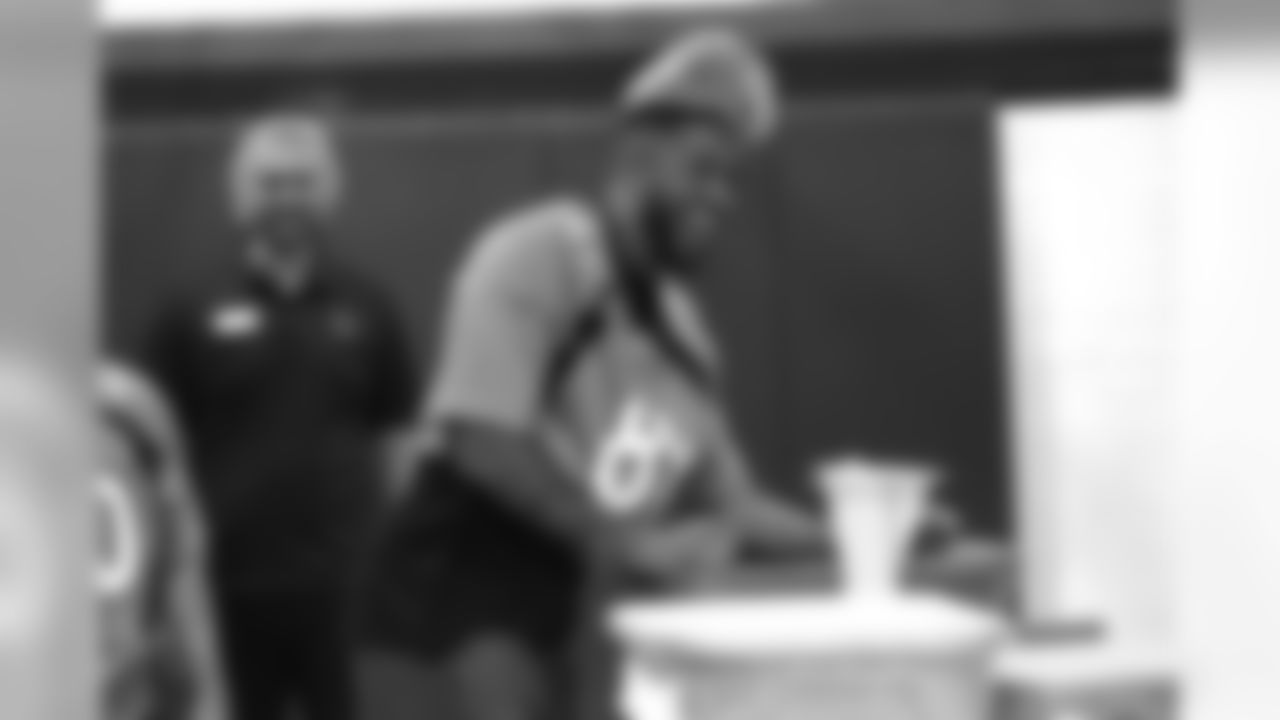It was a busy day at the Denver Broncos Boys & Girls Club on Tuesday, as the club hosted a volunteer meal-packaging event with Broncos players, Denver police officers and children from the club to support Feeding Children Everywhere and an eye-examination day for Von's Vision.

Fred Brown during a meal-packaging event with Feeding Children Everywhere at the Denver Broncos Boys & Girls Club on May 14, 2019, with volunteers from the Broncos, the Denver Police Department and the club.

Horace Richardson, De'Vante Bausby, Trey Johnson, Fred Brown, Aaron Burbridge and Linden Stephens during a meal-packaging event with Feeding Children Everywhere at the Denver Broncos Boys & Girls Club on May 14, 2019, with volunteers from the Broncos, the Denver Police Department and the club.

Tim Patrick during a meal-packaging event with Feeding Children Everywhere at the Denver Broncos Boys & Girls Club on May 14, 2019, with volunteers from the Broncos, the Denver Police Department and the club.

Phillip Lindsay during a meal-packaging event with Feeding Children Everywhere at the Denver Broncos Boys & Girls Club on May 14, 2019, with volunteers from the Broncos, the Denver Police Department and the club.

Phillip Lindsay greets a police officer during a meal-packaging event with Feeding Children Everywhere at the Denver Broncos Boys & Girls Club on May 14, 2019, with volunteers from the Broncos, the Denver Police Department and the club.

Justin Simmons and Bryce Callahan greet police officers during a meal-packaging event with Feeding Children Everywhere at the Denver Broncos Boys & Girls Club on May 14, 2019, with volunteers from the Broncos, the Denver Police Department and the club.

Trey Johnson greets a police officer during a meal-packaging event with Feeding Children Everywhere at the Denver Broncos Boys & Girls Club on May 14, 2019, with volunteers from the Broncos, the Denver Police Department and the club.

Justin Simmons greets police officers during a meal-packaging event with Feeding Children Everywhere at the Denver Broncos Boys & Girls Club on May 14, 2019, with volunteers from the Broncos, the Denver Police Department and the club.

Tim Patrick puts on a hairnet during a meal-packaging event with Feeding Children Everywhere at the Denver Broncos Boys & Girls Club on May 14, 2019, with volunteers from the Broncos, the Denver Police Department and the club.

Aaron Burbridge talks with a police officer during a meal-packaging event with Feeding Children Everywhere at the Denver Broncos Boys & Girls Club on May 14, 2019, with volunteers from the Broncos, the Denver Police Department and the club.

Police officers during a meal-packaging event with Feeding Children Everywhere at the Denver Broncos Boys & Girls Club on May 14, 2019, with volunteers from the Broncos, the Denver Police Department and the club.

Bryce Callahan and Horace Richardson during a meal-packaging event with Feeding Children Everywhere at the Denver Broncos Boys & Girls Club on May 14, 2019, with volunteers from the Broncos, the Denver Police Department and the club.

Justin Simmons during a meal-packaging event with Feeding Children Everywhere at the Denver Broncos Boys & Girls Club on May 14, 2019, with volunteers from the Broncos, the Denver Police Department and the club.

Tim Patrick and Phillip Lindsay listen to instructions during a meal-packaging event with Feeding Children Everywhere at the Denver Broncos Boys & Girls Club on May 14, 2019, with volunteers from the Broncos, the Denver Police Department and the club.

A police officer with a club member during a meal-packaging event with Feeding Children Everywhere at the Denver Broncos Boys & Girls Club on May 14, 2019, with volunteers from the Broncos, the Denver Police Department and the club.

Bryce Callahan during a meal-packaging event with Feeding Children Everywhere at the Denver Broncos Boys & Girls Club on May 14, 2019, with volunteers from the Broncos, the Denver Police Department and the club.

Linden Stephens and De'Vante Bausby during a meal-packaging event with Feeding Children Everywhere at the Denver Broncos Boys & Girls Club on May 14, 2019, with volunteers from the Broncos, the Denver Police Department and the club.

A FCE staffer adds more macaroni during a meal-packaging event with Feeding Children Everywhere at the Denver Broncos Boys & Girls Club on May 14, 2019, with volunteers from the Broncos, the Denver Police Department and the club.

Von Miller during a meal-packaging event with Feeding Children Everywhere at the Denver Broncos Boys & Girls Club on May 14, 2019, with volunteers from the Broncos, the Denver Police Department and the club.

Fred Brown during a meal-packaging event with Feeding Children Everywhere at the Denver Broncos Boys & Girls Club on May 14, 2019, with volunteers from the Broncos, the Denver Police Department and the club.

Phillip Lindsay during a meal-packaging event with Feeding Children Everywhere at the Denver Broncos Boys & Girls Club on May 14, 2019, with volunteers from the Broncos, the Denver Police Department and the club.

Fred Brown and Trey Johnson during a meal-packaging event with Feeding Children Everywhere at the Denver Broncos Boys & Girls Club on May 14, 2019, with volunteers from the Broncos, the Denver Police Department and the club.

Von Miller during a meal-packaging event with Feeding Children Everywhere at the Denver Broncos Boys & Girls Club on May 14, 2019, with volunteers from the Broncos, the Denver Police Department and the club.

Tim Patrick during a meal-packaging event with Feeding Children Everywhere at the Denver Broncos Boys & Girls Club on May 14, 2019, with volunteers from the Broncos, the Denver Police Department and the club.

Justin Simmons during a meal-packaging event with Feeding Children Everywhere at the Denver Broncos Boys & Girls Club on May 14, 2019, with volunteers from the Broncos, the Denver Police Department and the club.

Von Miller during a meal-packaging event with Feeding Children Everywhere at the Denver Broncos Boys & Girls Club on May 14, 2019, with volunteers from the Broncos, the Denver Police Department and the club.

Aaron Wallace during a meal-packaging event with Feeding Children Everywhere at the Denver Broncos Boys & Girls Club on May 14, 2019, with volunteers from the Broncos, the Denver Police Department and the club.

Horace Richardson during a meal-packaging event with Feeding Children Everywhere at the Denver Broncos Boys & Girls Club on May 14, 2019, with volunteers from the Broncos, the Denver Police Department and the club.

Von Miller during a meal-packaging event with Feeding Children Everywhere at the Denver Broncos Boys & Girls Club on May 14, 2019, with volunteers from the Broncos, the Denver Police Department and the club.

Phillip Lindsay rings a bell marking the completion of a box during a meal-packaging event with Feeding Children Everywhere at the Denver Broncos Boys & Girls Club on May 14, 2019, with volunteers from the Broncos, the Denver Police Department and the club.

Von Miller during a meal-packaging event with Feeding Children Everywhere at the Denver Broncos Boys & Girls Club on May 14, 2019, with volunteers from the Broncos, the Denver Police Department and the club.

Bryce Callahan during a meal-packaging event with Feeding Children Everywhere at the Denver Broncos Boys & Girls Club on May 14, 2019, with volunteers from the Broncos, the Denver Police Department and the club.

Linden Stephens during a meal-packaging event with Feeding Children Everywhere at the Denver Broncos Boys & Girls Club on May 14, 2019, with volunteers from the Broncos, the Denver Police Department and the club.

During a meal-packaging event with Feeding Children Everywhere at the Denver Broncos Boys & Girls Club on May 14, 2019, with volunteers from the Broncos, the Denver Police Department and the club.

Aaron Burbridge during a meal-packaging event with Feeding Children Everywhere at the Denver Broncos Boys & Girls Club on May 14, 2019, with volunteers from the Broncos, the Denver Police Department and the club.

Von Miller poses for a photo during a meal-packaging event with Feeding Children Everywhere at the Denver Broncos Boys & Girls Club on May 14, 2019, with volunteers from the Broncos, the Denver Police Department and the club.

Phillip Lindsay during a meal-packaging event with Feeding Children Everywhere at the Denver Broncos Boys & Girls Club on May 14, 2019, with volunteers from the Broncos, the Denver Police Department and the club.

Children from the club during a meal-packaging event with Feeding Children Everywhere at the Denver Broncos Boys & Girls Club on May 14, 2019, with volunteers from the Broncos, the Denver Police Department and the club.

Linden Stephens during a meal-packaging event with Feeding Children Everywhere at the Denver Broncos Boys & Girls Club on May 14, 2019, with volunteers from the Broncos, the Denver Police Department and the club.

Children from the club during a meal-packaging event with Feeding Children Everywhere at the Denver Broncos Boys & Girls Club on May 14, 2019, with volunteers from the Broncos, the Denver Police Department and the club.

Tim Patrick during a meal-packaging event with Feeding Children Everywhere at the Denver Broncos Boys & Girls Club on May 14, 2019, with volunteers from the Broncos, the Denver Police Department and the club.

A police officer during a meal-packaging event with Feeding Children Everywhere at the Denver Broncos Boys & Girls Club on May 14, 2019, with volunteers from the Broncos, the Denver Police Department and the club.

Aaron Wallace during a meal-packaging event with Feeding Children Everywhere at the Denver Broncos Boys & Girls Club on May 14, 2019, with volunteers from the Broncos, the Denver Police Department and the club.

Tim Patrick during a meal-packaging event with Feeding Children Everywhere at the Denver Broncos Boys & Girls Club on May 14, 2019, with volunteers from the Broncos, the Denver Police Department and the club.

A group photo of all the participants during a meal-packaging event with Feeding Children Everywhere at the Denver Broncos Boys & Girls Club on May 14, 2019, with volunteers from the Broncos, the Denver Police Department and the club.

A group photo of all the participants during a meal-packaging event with Feeding Children Everywhere at the Denver Broncos Boys & Girls Club on May 14, 2019, with volunteers from the Broncos, the Denver Police Department and the club.

Tim Patrick plays basketball with kids after a meal-packaging event with Feeding Children Everywhere at the Denver Broncos Boys & Girls Club on May 14, 2019.

Trey Johnson plays basketball with kids after a meal-packaging event with Feeding Children Everywhere at the Denver Broncos Boys & Girls Club on May 14, 2019.

Kids after a meal-packaging event with Feeding Children Everywhere at the Denver Broncos Boys & Girls Club on May 14, 2019.

Trey Johnson plays basketball with kids after a meal-packaging event with Feeding Children Everywhere at the Denver Broncos Boys & Girls Club on May 14, 2019.

Linden Stephens plays basketball with kids after a meal-packaging event with Feeding Children Everywhere at the Denver Broncos Boys & Girls Club on May 14, 2019.

A kid after a meal-packaging event with Feeding Children Everywhere at the Denver Broncos Boys & Girls Club on May 14, 2019.

Kids play games after a meal-packaging event with Feeding Children Everywhere at the Denver Broncos Boys & Girls Club on May 14, 2019.

Phillip Lindsay plays games with kids after a meal-packaging event with Feeding Children Everywhere at the Denver Broncos Boys & Girls Club on May 14, 2019.

During a Von's Vision eye examination at the Denver Broncos Boys & Girls Club on May 14, 2019.

During a Von's Vision eye examination at the Denver Broncos Boys & Girls Club on May 14, 2019.

During a Von's Vision eye examination at the Denver Broncos Boys & Girls Club on May 14, 2019.

During a Von's Vision eye examination at the Denver Broncos Boys & Girls Club on May 14, 2019.

During a Von's Vision eye examination at the Denver Broncos Boys & Girls Club on May 14, 2019.

During a Von's Vision eye examination at the Denver Broncos Boys & Girls Club on May 14, 2019.

During a Von's Vision eye examination at the Denver Broncos Boys & Girls Club on May 14, 2019.

During a Von's Vision eye examination at the Denver Broncos Boys & Girls Club on May 14, 2019.

During a Von's Vision eye examination at the Denver Broncos Boys & Girls Club on May 14, 2019.

During a Von's Vision eye examination at the Denver Broncos Boys & Girls Club on May 14, 2019.

During a Von's Vision eye examination at the Denver Broncos Boys & Girls Club on May 14, 2019.

During a Von's Vision eye examination at the Denver Broncos Boys & Girls Club on May 14, 2019.

During a Von's Vision eye examination at the Denver Broncos Boys & Girls Club on May 14, 2019.

During a Von's Vision eye examination at the Denver Broncos Boys & Girls Club on May 14, 2019.
ENGLEWOOD, Colo. — When first-year cornerback Linden Stephens signed up for a week shadowing the Los Angeles Police Department, he looked at it as an important learning opportunity.
He had seen the reports of officer-involved shootings that have been impossible to ignore over recent years, and as the NFL Players Association offered opportunities for players to be placed in one- or two-week programs with various companies or organizations, he thought he could gain a greater understanding of the situations that had become such a flash point across the country.
So, he flew out to Los Angeles in February for five days with the LAPD alongside six other NFL players.
Though he had an idea of what experiences would await him, he wanted to get a deeper insight into officers' actions and the thinking that goes into those decisions.
"I knew I wanted to understand how they could put themselves in a better situation, and the things that go into it," Stephens says. "How to use a gun, when to use it."
That week, Stephens worked full days with the LAPD — 9 a.m. until 6 or 7 p.m. He went on foot patrols through neighborhoods, did ride-alongs, visited schools and spoke with gang members who lived in the neighborhoods the officers were patrolling.
By the end of it all, Stephens came away from the externship with a bit more understanding of the day-to-day responsibilities that officers have and the risks they take.
"It's really a dangerous job to have," Stephens says. "You have [to have] a lot of awareness and be aware of your surroundings at all times. Your livelihood is on the table every day, so I really took that into consideration."
Underlying his desire to do this externship is a deep-seated belief in a responsibility to improve his community in whatever way he can.
"I enjoy helping people make an impact in my community," Stephens says. "… It can be a dangerous job, but I enjoy helping people making a difference. That's something that really caught my attention."
Denver Police Chief Paul Pazen says he believes Stephens' convictions reveal an important commonality that shows the bond between the two groups.
"Often we forget that police officers are part of the community, just as professional athletes are part of the community," Pazen says. "We all fit together, and it's important that we recognize that, that we ultimately have a lot of goals that are aligned. We have more things in common than differences. Sometimes when events happen across the country, it can drive a wedge between law enforcement and community, but we're all part of that same community."
During National Police Week this week, building that bridge becomes even more important. The Broncos did a small part of that Tuesday when a dozen players visited the Denver Broncos Boys & Girls Club along with numerous Denver police officers to package more than 12,000 individual meals for local families. Stephens was one of the players who took part.
"Police Week is a great time for us to reflect on those who have gone before, those who have given everything and not only celebrate what they have given, but also the officers that continue to do it," Pazen says. "When you have a law-enforcement agency like ours, who have had 72 women and men killed in the line of duty, sometimes you ask yourself, Why do we still have officers willing to do this? What drives them to do this? The economy is great. They don't need this job. So it just shows that there's a higher calling. It's just during this week, it's good to reflect on why we're drawn to this field in the first place and what it means, the responsibilities we have as a result and what opportunities we have as a result. It's just a great time to reflect on the kind of totality of this position."
Stephens may have focused on law enforcement with this externship as a learning experience, but if he wants to transition it into a career opportunity after his NFL career, he will likely have the opportunity to do what many former players have done.
In Denver, there are at least three former NFL players serving as police officers, per Pazen. He says the transition from pro athlete to police officer is a natural one.
"There's a lot of similarities in what we're looking for," Pazen says. "You want professional athletes or football players to have big hearts and really be passionate about what they do, and it's the same here in the police department."














